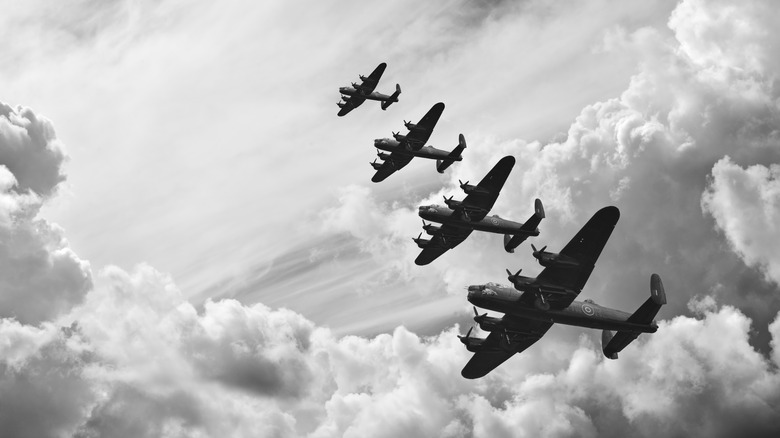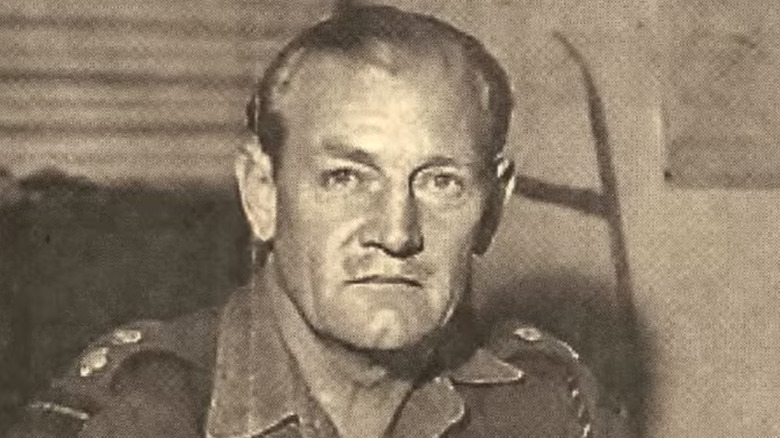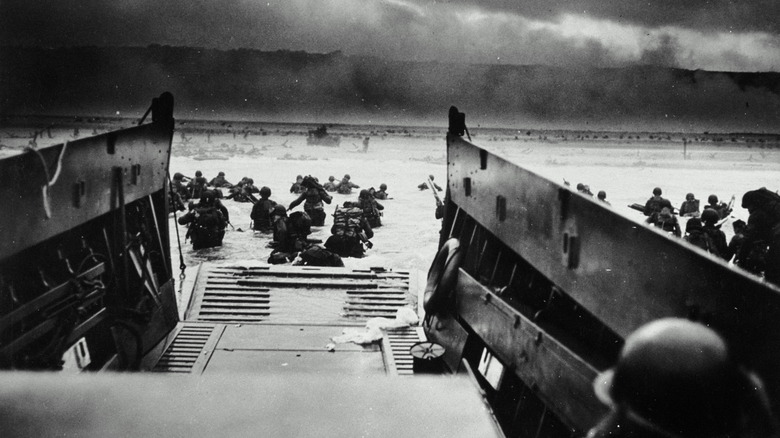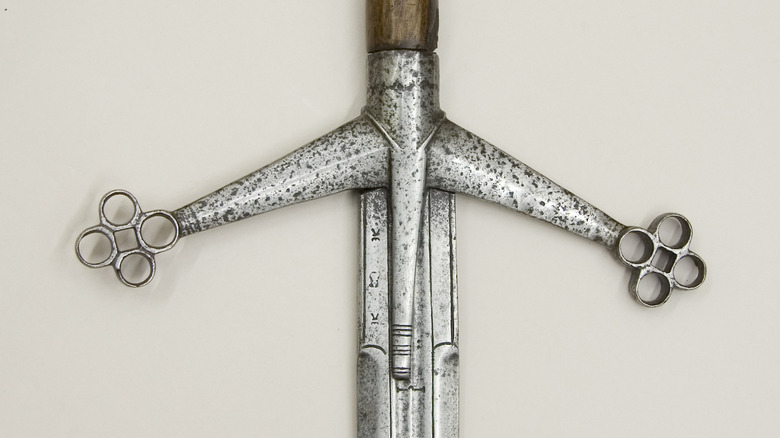The Story Of The British WWII Soldier Who Fought With A Claymore Sword And A Long Bow
The Second World War was scored by mortar shells that sounded like giants crashing to the ground, and flash bangs painted the nocturnal horizon in strobed fragments of neon terror like something out of an H.P. Lovecraft novel. On all sides of combat, some 70 million soldiers met their deaths or earned their glory in the firefights of a war-stricken Europe (via Britannica).
"Any officer who goes into action without his sword is improperly dressed," British recruit Jack Churchill famously once said, and that was no mere figure of speech. According to Historic UK, Churchill charged into battle with a Scottish broadsword and a longbow. And while you'd think that an untimely martyr's death was practically unavoidable for someone like that, Churchhill miraculously lived to tell the tale of his glorious feats on the battlefield and is still remembered as having been one of the most pivotal and crucial forces in the Allied war effort.
Who was Jack Churchill?
The man who earned the monikers "Mad" and "Fighting" Jack was born John Malcolm Thorpe Fleming Churchill in 1906 (he bore no relation to Winston Churchill). His family was living in Hong Kong at the time of his birth, as his father was a senior administrator in the colonial service (per Historic UK). He had two brothers, Thomas Bell Lindsay Churchill and Robert Alec Farquhar Churchill, both of whom also fought heroically against the Axis powers during WWII (the latter was killed in action in 1942).
Before taking up with the Manchester Regiment in 1926, Churchill attended college, though his adventurous spirit and thirst for glory made military life virtually inevitable. It was during his initial enlistment that Churchill became an exceptional bagpipe player, and he would later utilize this talent to inspire his fellow soldiers while marching into battle, as Warfare History Network reports. After parting ways with the Manchester Regiment in 1936 (and prior to), he dabbled in show business for a time, trying his luck as a male model and an actor. Churchill's limitless ambitions surged throughout the entirety of his youth, and by the time the Second World War started to rear its ugly head, his grandiosity had found the ideal channel through which to flourish.
World War II begins
"I was back in my red coat," Jack Churchill reflected years later (via Warfare History Network), "the country having got into a jam in my absence." In 1939, shortly after Germany's invasion of Poland, he reacquainted himself with the Manchester Regiment and was sent off to France. Churchill was back in uniform again, and this time, the game was blood for blood as the Axis shadow continued to cast its harrowing shape over the trembling free world. In 1940, when German forces descended upon his battalion — of which he was second in command at the time — they were met with fiery retaliation (via Warfare History Network).
As a leading figure in his battalion, Churchill showed immense promise and inspired hope amongst his fellow soldiers, and when hell broke loose on the field of battle, he made sure he was well-armed. Of course, being "well-armed" in the eyes of Fighting Jack Churchill meant something entirely different, as Historic UK reports.
A soldier, his sword, and his bow
According to Survival Freedom, the traditional longbow has a hunting range of up to 180 feet, and in comparison to the sinister crackle of a rifle shot, it's quite stealthy. Jack Churchill understood this better than anyone, and given his predilection for reconnaissance missions and subtle infiltration tactics, it proved to be the ideal weapon (according to Warfare History Network, he'd become an expert marksman with the long bow during the 1930s). Historic UK reports that the first advancing Nazi soldier during the Battle of l'Epinette was met with one of Churchill's deadly arrows. The nameless grunt was one of many others who would die by the British war mogul's primitive weapon during the war.
He also stood by his principled declaration of keeping a sword on him in the heat of battle, never advancing without his razor-sharp Scottish claymore strapped across his back. That's not to say he didn't utilize grenades and machine guns as well, but his proficiency in medieval weaponry — especially in the context of contemporary warfare — is what he's most remembered for. Churchill's venerable actions during the Battle of l'Eponette earned him the honorable Military Cross — just one of his many war insignias. Those who were there recall him playing the bagpipes for all to hear following their iconic victory (per Historic UK).
Infiltrating the town of Piegoletti
Jack Churchill was awarded his next Military Cross following an astonishingly successful mission in the Italian town of Piegoletti during the historic Salerno landings. According to HistoryNet, he near single-handedly infiltrated the town and managed to take no less than 42 German soldiers captive. Alongside one corporal, Ruffell, Churchill crept into the enemy barracks and surprised a group of German soldiers occupying them. Warfare History Network reports that Mad Jack, claymore in hand, managed to take a sentry officer hostage and coerced the others into surrendering against seemingly impossible odds.
After subduing the German hostiles and collecting all of their weaponry — including a mortar crew — Churchill and Ruffell reportedly marched all 42 prisoners back to the British frontline and claimed victory once again. "I always bring my prisoners back with their weapons; it weighs them down," he once said (per Warfare History Network). However, hardship was hot upon his heels, and shortly after his revered exploits in Salerno, he was taken prisoner by enemy forces.
Jack Churchill — a man escaped
It was in Yugoslavia that the enemy finally apprehended the legendary Mad Jack Churchill. At first, his overseers assumed him to be of Winston Churchill's own bloodline, a presumption that very well may have saved his life at the moment (talk about a valuable hostage). However, according to Historic UK, he was treated the same as any other POW and found himself locked away alongside a group of Austrian prisoners in the belly of a concentration camp. Still, incarceration was no match for the fighting side of Fighting Jack.
He managed to tunnel beneath the fence and escaped with another prisoner, though the pair were reclaimed by scouts at the Baltic border and sent back to prison in Austria. Unbelievably, Churchill escaped again, and this time, he permanently evaded recapture after successfully crossing over the Brenner Pass and reaching asylum in Italy (per Warfare History Network).
Legacy and death
At long last, World War II had reached a just end, but Jack Churchill's thirst for bloody adventure was far from quenched. "If it wasn't for those damn Yanks, we could have kept the war going another 10 years!" he lamented (via Historic UK). After the Allies proclaimed victory, Churchill took up with the Seaforth Highlanders for a time, followed by a stint with the Highland Light Infantry. According to Warfare History Network, he found himself in Palestine in 1948 and shortly after oversaw the daring evacuation of some 700 hospital patients and personnel in Jerusalem who had come under enemy fire.
Eventually, Jack Churchill retired his longbow and his trusty claymore and settled down as an Army Apprentice and steamboat mechanic in England. He lived out his days peacefully alongside his wife and children and died in 1996 at the age of 89 (via Historic UK). To this day, the awe-inspiring wartime feats of the mighty Mad Jack still echo through the halls of history like the titanic bellowing of eternal bagpipes.






